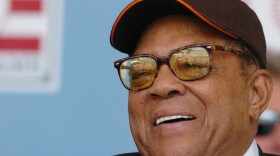LIANE HANSEN, host:
That Italian Alps played host to one of the Winter Olympics' premier events today, the men's downhill, and the slopes were very friendly to European skiers. Antoine Deneriaz of France won the gold. Michael Walchhofer of Austria captured the silver. And Bruno Kernen of Switzerland took the bronze.
Americans Bode Miller and Daron Rahlves will have to wait for another day to attempt to bring home medals.
NPR's Tom Goldman was on the slopes, and he's on the phone now. Hey, Tom, tell us more about the race.
TOM GOLDMAN reporting:
It was a great race, Liane, on a gorgeous day in the Italian Alps here in Sestriere. As you mentioned, Antoine Deneriaz continued a history of surprise winners of the Olympic men's downhill. He's ranked only 38th in World Cup standings so far in this season. Today he is ranked number one in the World, winning a very exciting and surprising gold medal for the French.
HANSEN: The silver was captured by Michael Walchhofer, of Austria, and there's been some rivalry, right, between him and the Austrian team and the American team?
GOLDMAN: Absolutely. Walchhofer was really the only bright spot for the Austrians. Herrman Meier, the Great Herrmonator, everybody remembers him, he finished sixth. And Fritz Strobel, the gold medal winner in 2002, finished eighth. The Americans, everyone was watching Bode Miller, he finished fifth, and Daron Rahvels finished tenth.
So the whole American/Austrian rivalry really never came to pass. As a matter of fact, Deneriaz had been quoted in an article about that rivalry and he said, you know, it's good that someone's pushing Austria, but it's good that other people win. And he certainly did today.
HANSEN: With a fifth place finish for Bode Miller in this event, is he in danger of getting a little more attention off the slopes than on them?
GOLDMAN: Well, definitely so. That's certainly been the case in the lead-up to these Olympics. He has been in a self-imposed silence mode with the media, because he knows what happens when he talks to the media. He gets in hot water, because he's a very outspoken guy. And he just decided, I'm not going to talk anymore, I'm going to concentrate on skiing.
Even though he didn't win the downhill, I mean he's great in all disciplines, but downhill isn't his real, real strength. I mean he's strong in everything. But so, you know, this is not to say that Bode Miller's not going to do well. And certainly fifth in the Olympic downhill is not bad at all.
Bode Miler is going to ski in all five disciplines, so there's still a lot time for him to make a statement on the slopes.
HANSEN: Michelle Kwan, American figure skater, this was her last attempt to try for a gold medal and she's pulled out of the competition because of a groin injury. What happens now?
GOLDMAN: Yeah, a real sad moment for Michelle Kwan, who got into the Olympics because of a medical waiver. She's been battling this groin injury that you mentioned and she's had hip problems all during the season. And it finally just caught up with her.
She did the training yesterday, and fell a couple of times, and was really apparently shaken by that, and was alluding to the fact that she may have to pull out of the Olympics. And this was supposed to be her grand moment, the time she would finally break through and win a gold medal.
She got, she was beaten of course in 1998 and 2002 by a couple of teenagers who came out of nowhere, Terra Lipinski and Sarah Hughes. Now Sarah Hughes' sister, Emily Hughes, steps in, because she was the first alternate after Kwan got in on the medical waiver. And now Emily Hughes has a shot to continue with the family legacy.
HANSEN: NPR's Tom Goldman, from the Italian Alps. Tom, thanks a lot.
GOLDMAN: You're welcome, Liane.
HANSEN: Members of NPR's Olympic team offer their insights and observations of the Games in the Turin Olympic Diary at our website, npr.org. Transcript provided by NPR, Copyright NPR.





